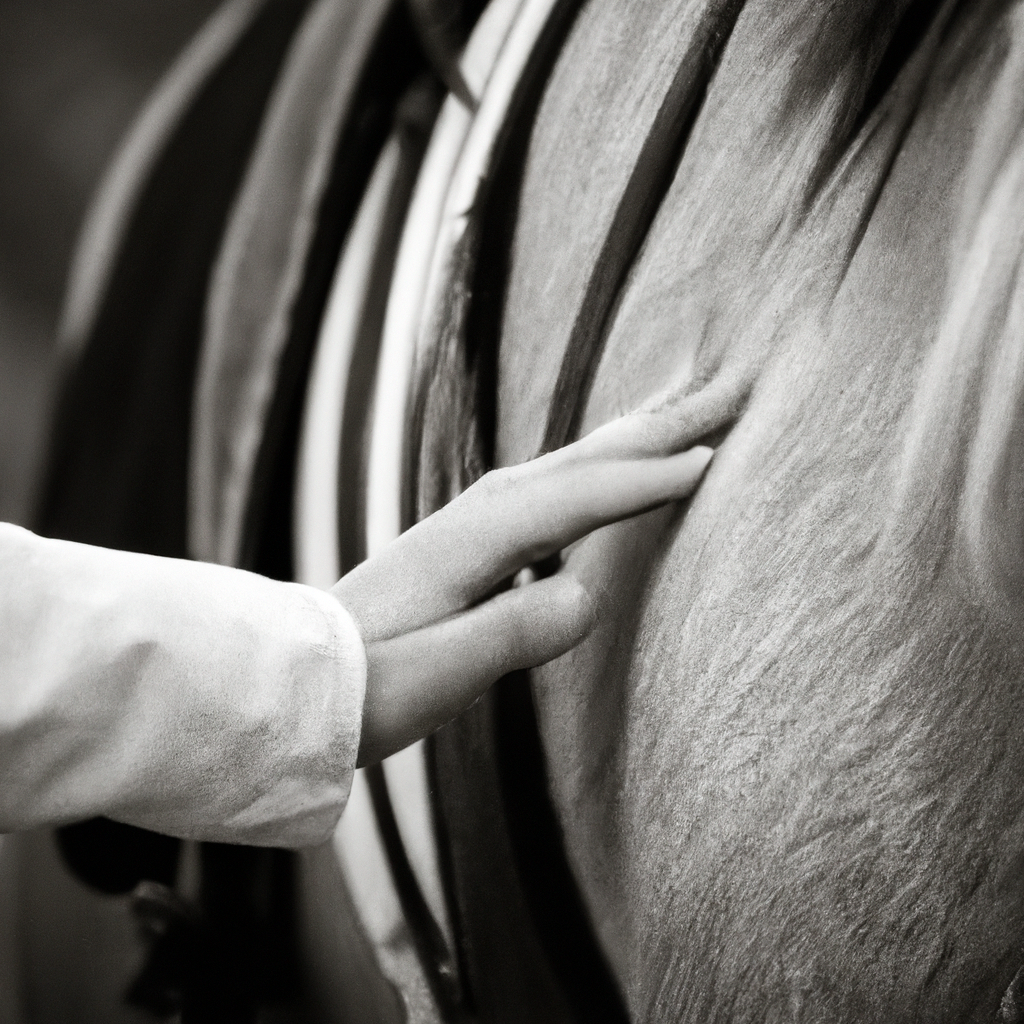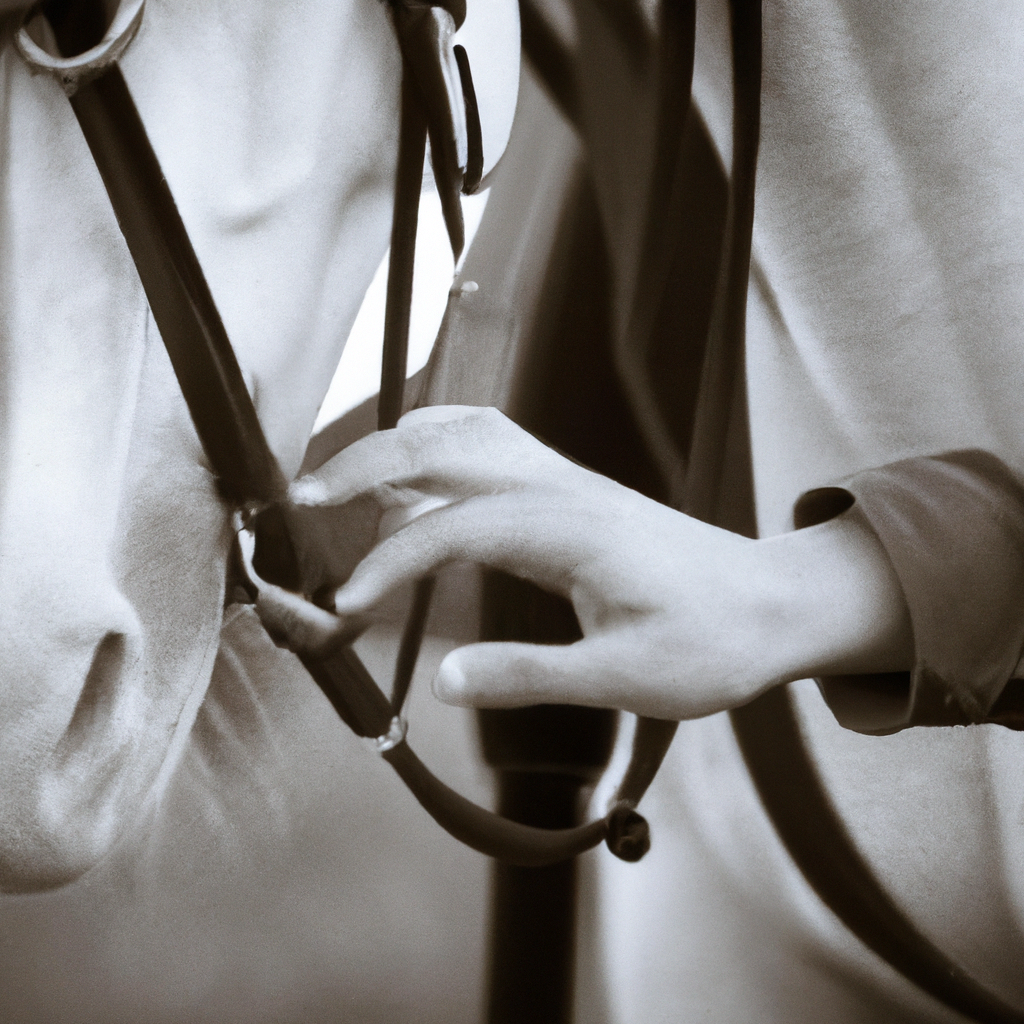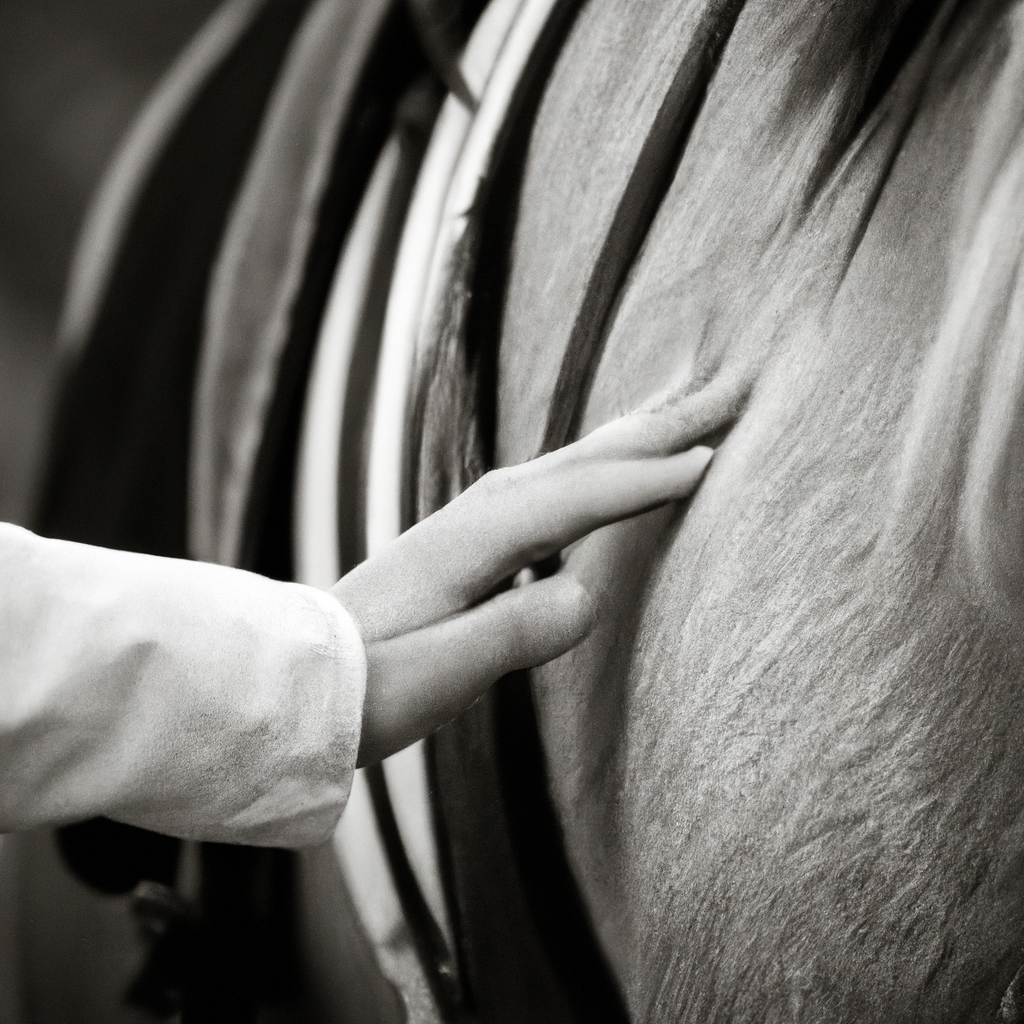Have you ever wondered if there’s a deeper connection between horseback riding and self-discovery? Well, it turns out that there is a strong link between the two. As you saddle up and embark on a horseback riding adventure, you not only conquer the fear of being on a majestic creature but also gain a newfound sense of confidence and self-awareness. The rhythmic motion of the horse’s gait, the bond developed with these magnificent animals, and the sheer beauty of nature surrounding you, all contribute to an enriching experience of self-discovery. So, get ready to explore the profound connection between horseback riding and uncovering your true self.

The Physical Benefits of Horseback Riding
Improved core strength
Horseback riding requires a strong core to maintain balance and stability while riding. The constant engagement of the core muscles helps to strengthen them over time.
Increased balance and coordination
Balancing on a moving horse requires coordination and a keen sense of balance. Horseback riding helps to improve balance and coordination as riders learn to adjust their body position according to the horse’s movements.
Enhanced cardiovascular fitness
Horseback riding is a physical activity that can increase heart rate and improve cardiovascular fitness. The constant movement and engagement of muscles during riding provide a cardiovascular workout.
Developed muscle tone
Regular horseback riding can lead to improved muscle tone throughout the body. The rider’s legs, thighs, and core muscles are especially engaged and strengthened during horseback riding.
Boosted flexibility and posture
Riding a horse requires a certain level of flexibility and good posture. The natural movements of the horse help to increase flexibility, while maintaining a correct riding position promotes good posture.
The Mental and Emotional Benefits of Horseback Riding
Reduced stress and anxiety
Spending time with horses and engaging in horseback riding can provide a therapeutic escape from daily stressors. The bond formed between horse and rider, as well as the focus required during riding, can help reduce stress and anxiety.
Enhanced mindfulness and presence
When riding a horse, it’s essential to be fully present in the moment. The attention and focus required during riding cultivate mindfulness, allowing riders to be fully present and in tune with their surroundings.
Improved self-confidence
Mastering the art of horseback riding and gaining control over such a majestic animal can greatly boost self-confidence. Overcoming challenges while riding helps riders develop a sense of accomplishment and belief in their abilities.
Increased patience and resilience
Horseback riding requires patience, as horses are sensitive and can sometimes be unpredictable. Dealing with these challenges helps riders develop resilience and patience in handling difficult situations.
Emotional connection and empathy with horses
Interacting with horses and building a bond with them can create a unique emotional connection. Horses are highly perceptive and responsive to human emotions, fostering empathy and emotional connection between horse and rider.
The Therapeutic Use of Horseback Riding
Equine-assisted therapy for individuals with disabilities
Horseback riding has proven to be a powerful therapeutic tool for individuals with disabilities. Equine-assisted therapy can improve physical, emotional, and cognitive abilities, providing individuals with a sense of freedom and accomplishment.
Supportive benefits for individuals with mental health conditions
Horseback riding has been shown to have positive effects on individuals with mental health conditions such as depression, anxiety, and PTSD. The rhythmic motion of the horse and the bonding experience can promote relaxation and emotional well-being.
Effectiveness in helping individuals with autism spectrum disorders
Horseback riding has been found to be beneficial for individuals with autism spectrum disorders. The sensory experience of riding and interacting with horses can help reduce sensory sensitivity and improve communication skills.
Psychological healing through interaction with horses
The presence of horses and the act of caring for them can have a profound impact on psychological healing. The non-judgmental nature of horses allows individuals to open up, express their emotions, and find solace in the therapeutic presence of these animals.
Equestrian therapy as a tool for personal growth
Equestrian therapy encompasses a range of activities that promote personal growth and development. Through horseback riding and other related exercises, individuals can learn problem-solving skills, build confidence, and develop a stronger sense of self.
The Relationship Between Horse and Rider
Building trust and communication
The relationship between a horse and its rider is built on trust and clear communication. As riders spend time forming a bond with their horses, trust develops, allowing for effective communication between rider and horse.
Bonding and forming a partnership
Riding a horse involves a partnership between the rider and the horse. Over time, as the two learn to work together and understand each other’s cues, a strong bond and partnership are formed.
Intuition and understanding non-verbal cues
Horseback riding requires riders to develop a keen sense of intuition and understanding of non-verbal cues. Horses communicate through body language, and riders learn to interpret and respond to these cues.
Building confidence through collaboration
Working together with a horse towards a common goal, such as navigating a challenging obstacle course, can build confidence in both the rider and the horse. The collaboration and successful outcomes contribute to a sense of accomplishment and confidence.
Mutual respect and partnership development
The relationship between horse and rider is characterized by mutual respect. As riders learn to listen and respond to their horses, respect deepens, fostering a strong and successful partnership.

The Connection Between Nature and Self-Discovery
Being in nature and its therapeutic effects
Spending time in nature has been proven to have numerous therapeutic effects on mental and physical well-being. Horseback riding provides an opportunity to connect with nature, immerse oneself in its beauty, and experience its calming effects.
Connecting with natural surroundings while horseback riding
Horseback riding allows individuals to connect with the natural surroundings on a deeper level. As riders explore trails and ride through scenic landscapes, they become more attuned to the beauty and serenity of the natural world.
Importance of outdoor activities for personal growth
Engaging in outdoor activities, such as horseback riding, is vital for personal growth and development. Being in nature encourages self-reflection, fosters resilience, and promotes a sense of adventure and exploration.
Developing an appreciation for nature and the environment
The close connection between horseback riding and nature encourages individuals to develop an appreciation for the environment. Riders witness the beauty and fragility of nature firsthand, fostering a desire to protect and preserve it.
Finding peace and tranquility in natural settings
Horseback riding allows individuals to escape the noise and distractions of everyday life and find peace and tranquility in natural settings. The serenity and calmness of nature contribute to a sense of well-being and inner peace.
The Role of Horseback Riding in Overcoming Challenges
Building resilience through riding struggles
Horseback riding involves overcoming various challenges, such as learning new riding skills or navigating difficult terrain. Facing and overcoming these challenges builds resilience and instills a sense of determination.
Facing and overcoming fears and insecurities
Horseback riding provides a unique opportunity to face and overcome fears and insecurities. Riding a powerful animal can be intimidating, but the process of conquering fears leads to personal growth and increased self-confidence.
Learning perseverance and determination
Horseback riding requires perseverance and determination. Riders must consistently practice and work through difficulties to improve their skills. This process of continuous learning fosters perseverance and the ability to overcome obstacles.
Embracing personal growth through overcoming obstacles
Every obstacle or challenge faced while horseback riding presents an opportunity for personal growth. Overcoming these obstacles not only enhances riding skills but also builds confidence and resilience in other aspects of life.
Gaining a sense of achievement and empowerment
Accomplishing goals and overcoming challenges while horseback riding brings a sense of achievement and empowerment. The feeling of mastering new skills or successfully navigating difficult trails fosters a positive mindset and a belief in one’s abilities.
The Connection Between Horseback Riding and Mindfulness
Mindful riding techniques and practices
Mindful riding involves being fully present in the moment and consciously engaging with the horse. Riders can practice mindful techniques such as focusing on their breath, observing sensory experiences, and maintaining awareness of their body movements.
Focusing on the present moment while horseback riding
Horseback riding provides an opportunity to escape from thoughts about the past or future and focus on the present moment. Riders can experience a sense of mindfulness by immersing themselves in the sensations and experiences of riding.
Developing a deeper connection with oneself and the horse
Mindful horseback riding cultivates a deeper connection between rider and horse. By being fully present, riders become more attuned to their own emotions and the subtle cues and responses from their horses.
Enhancing self-awareness and self-reflection
Practicing mindfulness while horseback riding encourages self-awareness and self-reflection. Riders can observe their thoughts, emotions, and physical sensations, gaining insights into themselves and their interactions with the horse.
Finding inner peace and calmness through mindful riding
By practicing mindfulness during horseback riding, riders can achieve a state of inner peace and calmness. Focusing on the present moment and letting go of distractions or worries creates a tranquil experience that promotes relaxation and emotional well-being.
The Connection Between Horseback Riding and Personal Transformation
Exploring personal strengths and weaknesses
Horseback riding provides a platform for individuals to explore their personal strengths and weaknesses. Through the challenges and experiences encountered while riding, individuals can gain a deeper understanding of themselves.
Self-discovery through challenging equestrian experiences
Challenging equestrian experiences can lead to self-discovery and personal growth. When faced with difficult situations on horseback, individuals learn about their limits, resilience, and problem-solving abilities.
Growth and transformation in character and mindset
Engaging in horseback riding can facilitate significant growth and transformation in both character and mindset. The discipline and dedication required in riding contribute to personal development and a shift in perspective.
Developing discipline and commitment
Horseback riding demands discipline and commitment. Regular practice, consistency, and adherence to training schedules cultivate discipline, which can be applied to other areas of life, leading to personal growth and achievement.
Achieving personal goals and aspirations
Setting and accomplishing personal goals is a fundamental aspect of horseback riding. Whether it’s improving riding skills, participating in competitions, or exploring new riding techniques, attaining personal goals leads to a sense of fulfillment and accomplishment.
The Connection Between Horseback Riding and Therapeutic Writing
Expressive writing as a tool for personal reflection
Therapeutic writing provides an outlet for personal reflection and emotional expression. Individuals can benefit from journaling about their horseback riding experiences, exploring their thoughts, feelings, and insights.
Journaling about horseback riding experiences
Keeping a journal dedicated to horseback riding experiences allows riders to document their journeys, track progress, and record memorable moments. Journaling can serve as a form of self-reflection and a way to process emotions related to riding.
Writing as a means of processing emotions and personal growth
Writing about horseback riding experiences can be a cathartic process. It allows riders to delve deeper into their emotions, gain clarity, and facilitate personal growth and self-awareness.
The therapeutic benefits of storytelling through writing
Sharing horseback riding experiences through storytelling can have therapeutic benefits. Writing engaging narratives about memorable rides or meaningful experiences can provide inspiration and connection with others.
Creative writing prompts related to horseback riding
Creative writing prompts can spark imagination and inspire riders to explore different aspects of horseback riding. Prompts such as “Describe your most memorable ride and how it impacted you” can help riders delve into their experiences and express them creatively.
The Connection Between Horseback Riding and Personal Identity
Exploring individuality through equestrian activities
Horseback riding enables individuals to explore and express their individuality. Through the unique experience of riding, individuals can discover and embrace aspects of themselves that align with their passion for horses.
Horseback riding as a form of self-expression
For many riders, horseback riding serves as a powerful form of self-expression. The way riders ride, care for their horses, and interact with the equestrian community reflects their personal identity and values.
Developing a sense of belonging in the equestrian community
Engaging in horseback riding fosters a sense of belonging within the equestrian community. Being surrounded by like-minded individuals who share a passion for horses creates a supportive environment for personal growth and identity development.
Connecting with personal values and passions
Horseback riding allows individuals to connect with their personal values and passions. The love for horses, the dedication to the sport, and the desire for personal growth align with individuals’ core values and contribute to their self-identity.
Identity formation through the equestrian lifestyle
Participating in the equestrian lifestyle plays a vital role in identity formation. The commitment to caring for horses, the dedication to training, and the pursuit of equestrian goals shape individuals’ identities and contribute to their sense of self.
